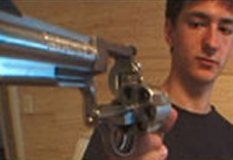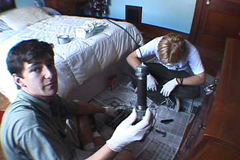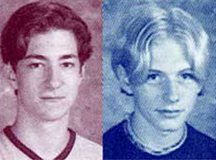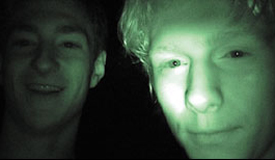Zero Day (Ben Coccio, 2003)
 Calvin and Andre, the self-described
“Army of Two” that Ben Coccio’s school-shooting drama Zero
Day focuses on, seem, almost to an absurd degree, to be outwardly normal
teenagers. They have an usual predilection for videotaping themselves and
certainly aren’t the most popular kids in their school, but in watching them
talk to their parents or hang out at a party, they hardly seem the sort that
would be predisposed toward such profoundly antisocial behavior. That’s
probably one of the film’s main points. Starting in the summer of 2000, Zero Day traces a year in the lives of Calvin and Andre as they
initiate and execute a covert campaign of teen terror. Presented almost entirely
as a series of confessional homemade movies shot by the perpetrators themselves
(a device that is slightly strained at times), the film thoroughly documents the
process leading up to the school shooting, but leaves the motivation behind it
frustratingly unarticulated.
Calvin and Andre, the self-described
“Army of Two” that Ben Coccio’s school-shooting drama Zero
Day focuses on, seem, almost to an absurd degree, to be outwardly normal
teenagers. They have an usual predilection for videotaping themselves and
certainly aren’t the most popular kids in their school, but in watching them
talk to their parents or hang out at a party, they hardly seem the sort that
would be predisposed toward such profoundly antisocial behavior. That’s
probably one of the film’s main points. Starting in the summer of 2000, Zero Day traces a year in the lives of Calvin and Andre as they
initiate and execute a covert campaign of teen terror. Presented almost entirely
as a series of confessional homemade movies shot by the perpetrators themselves
(a device that is slightly strained at times), the film thoroughly documents the
process leading up to the school shooting, but leaves the motivation behind it
frustratingly unarticulated.
 I don’t mean to imply that I see the
lack of stated motivation as a weakness, however. As the frenzied media so aptly
proved after the Columbine attacks, most conjecture about the reasoning behind a
tragedy like the one in Zero Day is
thoroughly unsubstantiated. Almost as a direct response to the actions of media
following the Columbine attacks, and partially because they don’t want their
privacy invaded after they die, they burn their CD, book and videogame
collections, so the media can’t be blamed. There are small moments throughout
that would allow an interpretation that the boys are homosexual. There’s a
brief homoerotic flirtation between the two during a visit to the bank, and a
scene during which Cal’s girlfriend suggests Andre is gay because he acts
oddly, but it’s just as likely that she’s labeling him as such because her
undeveloped mind doesn’t have a better way to classify the disturbing quirks
in his behavior. Most likely a combination of the guarantee of attention, the
euphoric rush of getting away with something and a lack of true perspective into
the consequences of their actions is to blame. The night before their spree,
Andre declares, “Fuck the reasons, there are none!”, and then quickly starts
talking about an incident during which he was called a “faggot” while
walking down the hall in a shirt from J.C. Penny’s. In their faulty logic,
this is a great injustice, and at least on some level, they see the message
they’re sending as one to “respect and love your fellow man.” What is
apparent through all of this speculation is that the two of them are aware
they’ll die during their spree, though the concept of death seems more
abstract for Andre than for Cal. Death chillingly never seems like much of a
deterrent.
I don’t mean to imply that I see the
lack of stated motivation as a weakness, however. As the frenzied media so aptly
proved after the Columbine attacks, most conjecture about the reasoning behind a
tragedy like the one in Zero Day is
thoroughly unsubstantiated. Almost as a direct response to the actions of media
following the Columbine attacks, and partially because they don’t want their
privacy invaded after they die, they burn their CD, book and videogame
collections, so the media can’t be blamed. There are small moments throughout
that would allow an interpretation that the boys are homosexual. There’s a
brief homoerotic flirtation between the two during a visit to the bank, and a
scene during which Cal’s girlfriend suggests Andre is gay because he acts
oddly, but it’s just as likely that she’s labeling him as such because her
undeveloped mind doesn’t have a better way to classify the disturbing quirks
in his behavior. Most likely a combination of the guarantee of attention, the
euphoric rush of getting away with something and a lack of true perspective into
the consequences of their actions is to blame. The night before their spree,
Andre declares, “Fuck the reasons, there are none!”, and then quickly starts
talking about an incident during which he was called a “faggot” while
walking down the hall in a shirt from J.C. Penny’s. In their faulty logic,
this is a great injustice, and at least on some level, they see the message
they’re sending as one to “respect and love your fellow man.” What is
apparent through all of this speculation is that the two of them are aware
they’ll die during their spree, though the concept of death seems more
abstract for Andre than for Cal. Death chillingly never seems like much of a
deterrent.
 As intelligently vague as Zero Day remains with regards to clear reasons behind its characters
actions, it has a tendency to oversimplify in its presentation. That the boys
managed to capture on video almost every key moment in their plan’s evolution
through the course of a year seems overly contrived at times. Less satisfactory
are the titles and subtitles that give the audience the character names,
translations of the language Andre’s father speaks and dates. Even the
smoothly edited chronology of the footage annoys, since it puts an additional
layer between the viewer and the characters that makes it feel more like the
film is a media assembled collection of highlights from the thirty or so hours
of footage the killers shot than a raw pseudo-confession from the criminals
themselves. Perhaps most irksome of all to me is the fact that no character in
the film ever utters the dreaded word that hangs over all of the proceedings:
Columbine. I can certainly understand that this might have been out of deference
for the families of the victims or an attempt to make the film less specific
than it might otherwise have been, but it’s almost inconceivable that two boys
planning an attack like this one, even if they talk in code at times, wouldn’t
directly address those attacks, by name. To treat that real-life tragedy as
something off limits - to shy away from it - is to sanctify it in a way that
gets away from a true understanding of it.
As intelligently vague as Zero Day remains with regards to clear reasons behind its characters
actions, it has a tendency to oversimplify in its presentation. That the boys
managed to capture on video almost every key moment in their plan’s evolution
through the course of a year seems overly contrived at times. Less satisfactory
are the titles and subtitles that give the audience the character names,
translations of the language Andre’s father speaks and dates. Even the
smoothly edited chronology of the footage annoys, since it puts an additional
layer between the viewer and the characters that makes it feel more like the
film is a media assembled collection of highlights from the thirty or so hours
of footage the killers shot than a raw pseudo-confession from the criminals
themselves. Perhaps most irksome of all to me is the fact that no character in
the film ever utters the dreaded word that hangs over all of the proceedings:
Columbine. I can certainly understand that this might have been out of deference
for the families of the victims or an attempt to make the film less specific
than it might otherwise have been, but it’s almost inconceivable that two boys
planning an attack like this one, even if they talk in code at times, wouldn’t
directly address those attacks, by name. To treat that real-life tragedy as
something off limits - to shy away from it - is to sanctify it in a way that
gets away from a true understanding of it.
 Some of the other small miscalculations
of Zero Day seem like the more
forgivable errors that a first time director might make than ideological
statements. For example, the placement of two American flags behind Cal as he
describes meeting Andre is a case of metaphoric overkill in a movie that’s
otherwise quite naturalistic. Such gaffes are a small price to pay for a movie
that contains moments as disturbing and touching as the one near the end of the
movie in which Andre’s father observes that he feels his son has matured a lot
in the preceding year. It’s no doubt that the two young actors that portray
the boys are talented (even if it’s a lot easier to get a quality performance
when shooting on home video cameras with no real crew), and the film would be
greatly reduced if they didn’t possess such unaffected, believable charm. When
Zero Day finally shows these two kids
we’ve grown to know realize their plan, the tension rackets up to an
unbelievable level, partially because the security camera’s point of view that
we view the action from recalls footage that surfaced of the Columbine
shootings. It’s a powerhouse sequence that easily relies as much on our
collective conscience of real-life tragedy as the talents of the filmmaker, but that
doesn’t keep it from being one of the most arresting scenes to hit theater
screens so far this year. Shot in real-time, it’s downright harrowing, and
made doubly unfortunate by the inclusion of an ambiguous but simpleminded
epilogue that robs Zero Day of a final
image that would have had infinitely more resonance.
Some of the other small miscalculations
of Zero Day seem like the more
forgivable errors that a first time director might make than ideological
statements. For example, the placement of two American flags behind Cal as he
describes meeting Andre is a case of metaphoric overkill in a movie that’s
otherwise quite naturalistic. Such gaffes are a small price to pay for a movie
that contains moments as disturbing and touching as the one near the end of the
movie in which Andre’s father observes that he feels his son has matured a lot
in the preceding year. It’s no doubt that the two young actors that portray
the boys are talented (even if it’s a lot easier to get a quality performance
when shooting on home video cameras with no real crew), and the film would be
greatly reduced if they didn’t possess such unaffected, believable charm. When
Zero Day finally shows these two kids
we’ve grown to know realize their plan, the tension rackets up to an
unbelievable level, partially because the security camera’s point of view that
we view the action from recalls footage that surfaced of the Columbine
shootings. It’s a powerhouse sequence that easily relies as much on our
collective conscience of real-life tragedy as the talents of the filmmaker, but that
doesn’t keep it from being one of the most arresting scenes to hit theater
screens so far this year. Shot in real-time, it’s downright harrowing, and
made doubly unfortunate by the inclusion of an ambiguous but simpleminded
epilogue that robs Zero Day of a final
image that would have had infinitely more resonance.
67
09-18-03
Jeremy Heilman